| Listing 1 - 10 of 14 | << page >> |
Sort by
|
Book
ISBN: 1282493965 9786612493966 0739132393 9780739132395 9780739132371 0739132377 9781282493964 6612493968 Year: 2009 Publisher: Lanham, Md. Lexington Books
Abstract | Keywords | Export | Availability | Bookmark
 Loading...
Loading...Choose an application
- Reference Manager
- EndNote
- RefWorks (Direct export to RefWorks)
Pragmatism and the Reflective Life explains the moral perspective embedded in the American pragmatist tradition and offers pragmatist moral thought as an alternative to analytic moral theory. Following the lead of John Dewey, Rosenbaum explores what it means to make the ideal of the reflective life implicit in pragmatism central to an understanding of morality. The discussion illuminates how this ideal of the reflective life captures the value of both individual autonomy and communal ideals and encourages commitment to a radically idealistic and ecumenical hope in the power of inclusive democracy and global egalitarianism.
Ethics. --- Pragmatism. --- Idealism --- Knowledge, Theory of --- Philosophy --- Philosophy, Modern --- Positivism --- Realism --- Utilitarianism --- Experience --- Reality --- Truth --- Deontology --- Ethics, Primitive --- Ethology --- Moral philosophy --- Morality --- Morals --- Philosophy, Moral --- Science, Moral --- Values
Book
ISBN: 1498510213 9781498510219 9781498510202 1498510205 Year: 2015 Publisher: Lanham
Abstract | Keywords | Export | Availability | Bookmark
 Loading...
Loading...Choose an application
- Reference Manager
- EndNote
- RefWorks (Direct export to RefWorks)
This book brings integrity to the center of philosophical conversations about morality and traces its roots as a philosophical idea to the American pragmatist tradition.
Integrity. --- Pragmatism. --- Idealism --- Knowledge, Theory of --- Philosophy --- Philosophy, Modern --- Positivism --- Realism --- Utilitarianism --- Experience --- Reality --- Truth --- Honesty --- Reliability
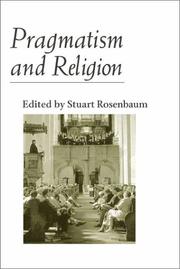
ISBN: 0252071220 9780252071225 Year: 2003 Publisher: Urbana: University of Illinois press,
Abstract | Keywords | Export | Availability | Bookmark
 Loading...
Loading...Choose an application
- Reference Manager
- EndNote
- RefWorks (Direct export to RefWorks)

ISBN: 0879755210 Year: 1989 Publisher: Buffalo Prometheus
Abstract | Keywords | Export | Availability | Bookmark
 Loading...
Loading...Choose an application
- Reference Manager
- EndNote
- RefWorks (Direct export to RefWorks)
Abortion, Legal. --- Abortion, Legal --- Ethics, Medical. --- Abortion --- -Abortion --- -Abortion, Induced --- Feticide --- Foeticide --- Induced abortion --- Pregnancy termination --- Termination of pregnancy --- Birth control --- Fetal death --- Obstetrics --- Reproductive rights --- Medical Ethics --- Medicine --- Professionalism --- Bioethics --- Abortion on Demand --- Abortions, Legal --- Legal Abortion --- Legal Abortions --- Population Control --- legislation & jurisprudence. --- Law and legislation --- Moral and ethical aspects --- Surgery --- ethics --- United States. --- -legislation & jurisprudence. --- Ethics, Medical --- Medical laws and legislation --- Sex and law --- legislation & jurisprudence --- Moral and religious aspects

ISBN: 0879754176 Year: 1988 Publisher: Buffalo Prometheus
Abstract | Keywords | Export | Availability | Bookmark
 Loading...
Loading...Choose an application
- Reference Manager
- EndNote
- RefWorks (Direct export to RefWorks)
Capital punishment --- Child care workers --- -Child development --- -Education, Preschool --- -Preschool teachers --- -Punishment --- Penalties (Criminal law) --- Penology --- Corrections --- Impunity --- Retribution --- Nursery-infant teachers --- Nursery school teachers --- Teachers, Preschool --- Early childhood teachers --- Children --- Infant education --- Prekindergarten --- Preschool education --- Early childhood education --- Nursery schools --- Child study --- Development, Child --- Developmental biology --- Developmental psychobiology --- Child rearing --- Cottage parents --- Group parents --- House parents --- Workers, Child care --- Abolition of capital punishment --- Death penalty --- Death sentence --- Criminal law --- Punishment --- Executions and executioners --- Training of --- -Training of --- -Education (Preschool) --- Development --- Capital punishment. --- Child development --- Education, Preschool --- Preschool teachers --- Punishment. --- -Capital punishment --- -Development --- Education (Preschool) --- -Capital punishment. --- -Training of -
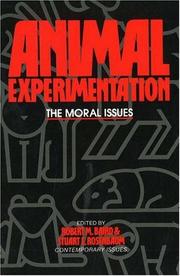
ISBN: 0879756675 Year: 1996 Publisher: Amherst (N.Y.) : Prometheus books,
Abstract | Keywords | Export | Availability | Bookmark
 Loading...
Loading...Choose an application
- Reference Manager
- EndNote
- RefWorks (Direct export to RefWorks)
Animal experimentation --- Animal rights. --- Animal experimentation --- Animal rights. --- Animals --- Moral and ethical aspects. --- Moral and ethical aspects. --- Treatment --- Moral and ethical aspects.
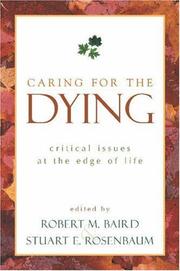
ISBN: 1573929697 Year: 2003 Publisher: Amherst: Prometheus Books
Abstract | Keywords | Export | Availability | Bookmark
 Loading...
Loading...Choose an application
- Reference Manager
- EndNote
- RefWorks (Direct export to RefWorks)
Since 1997, when Oregon enacted a law permitting physician-assisted suicide, the public debate over end-of-life issues has turned in a new direction. A major response to this law has been increased attention to providing support for the dying in ways that lessen the felt need for assisted suicide. The result has been renewed emphasis on hospice, palliative care, and the spiritual needs of the dying, as well as on advanced directives to settle legal matters. These are the four critical issues addressed by leading experts in this outstanding collection of recent articles on this controversial topic.The essays in section one clarify the role of hospice in providing care for the dying and debunk some commonly believed myths about hospice. Section two focuses on palliative care, considering when and to what extent suffering should be alleviated, and the use of drugs in palliative intervention. The articles in section three, on the spiritual needs of the dying, stress that caregivers must remain sensitive to the diverse traditions in which spiritual needs are rooted. The concluding section addresses, among other things, the importance of the advance directive and durable power of attorney, and litigation to remove restrictions that might impede physicians from prescribing adequate pain-management drugs.An underlying theme of all the contributions is that end-of-life needs vary for each individual. Awareness of this fact is crucial both for the dying and for their caregivers. The essays in this collection will help readers recognize and prepare for difficult end-of-life decisions.
Death --- Palliative treatment --- Terminal care --- Psychological aspects
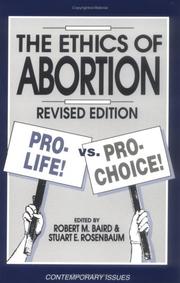
ISBN: 0879758058 Year: 1993 Publisher: Buffalo Prometheus
Abstract | Keywords | Export | Availability | Bookmark
 Loading...
Loading...Choose an application
- Reference Manager
- EndNote
- RefWorks (Direct export to RefWorks)
Abortion --- Law and legislation --- Moral and ethical aspects
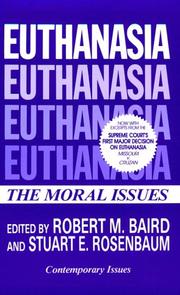
ISBN: 0879755555 Year: 1989 Publisher: Buffalo Prometheus
Abstract | Keywords | Export | Availability | Bookmark
 Loading...
Loading...Choose an application
- Reference Manager
- EndNote
- RefWorks (Direct export to RefWorks)
Euthanasia --- Ethics, Medical --- Euthanasia

ISBN: 1573921297 Year: 1997 Publisher: Amherst Prometheus Books
Abstract | Keywords | Export | Availability | Bookmark
 Loading...
Loading...Choose an application
- Reference Manager
- EndNote
- RefWorks (Direct export to RefWorks)
Same-sex marriage --- Law and legislation --- Moral and ethical aspects
| Listing 1 - 10 of 14 | << page >> |
Sort by
|

 Search
Search Feedback
Feedback About UniCat
About UniCat  Help
Help News
News